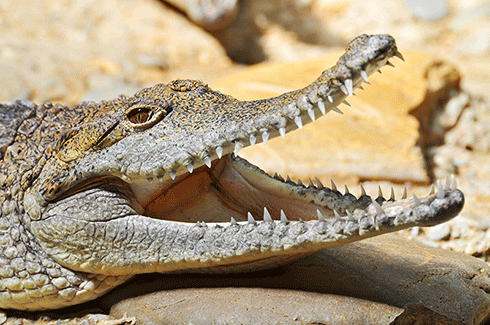
|
Published: 2 December 2014
CrocBITE snaps up support to improve croc awareness globally
A world-wide database compiling information about crocodilian attacks has received a funding boost that will improve accessibility and help with future conservation efforts of the species.

|
|
An online record of crocodile attacks on humans will inform and educate people on crocodile safety. Credit:
Flickr/Tambako The Jaguar CC BY-ND 2.0
|
Charles Darwin University (CDU) researcher Dr Adam Britton developed the CrocBITE database with Californian-based student Brandon Sideleau in 2013. It is now in use by wildlife managers and researchers around the world to improve species management and help save human lives.
Dr Britton has received more than AU$30 000 in funding through an Economic and Social Research Council Impact Acceleration Award, in collaboration with Imperial College London, to further develop the CrocBITE site.
‘When it launched there were around 1800 incidents registered on the database,’ Dr Britton said.
‘One year later, we have around 2700 incidents recorded, including new attacks but also additional historical records for various countries. It is one of the largest databases on human-animal conflict available free of charge to anyone.’
Dr Britton is working with Dr Simon Pooley of Imperial College London to expand the usefulness of the database to provide more educational content and improve the analysis and presentation tools used to interpret the information.
‘This funding will allow us to expand upon its usefulness and create interactive online tools that anyone can use to interpret the data, opening the door to simple discoveries being made by scientists and non-scientists alike that are relevant to their area,’ he said.
Dr Britton said the expansion would assist the researchers to provide vital information on crocodile attack data and communicate lessons to improve safety around crocodiles worldwide.
‘The goal of the project will be to better engage the public, local authorities, health workers and conservation managers to both contribute data and explore ways in which its lessons can be applied to saving lives,’ he said.
‘The aim will be to deliver these lessons to a wide audience, particularly in rural areas where the risk of crocodile attack is highest with the aim of improving awareness and mitigate risk of crocodile attack.’
Anyone can freely access the database, and members can contribute directly by setting up an account on the website and uploading information as a user, or by contacting the CrocBITE team via their website.
Source: CDU



